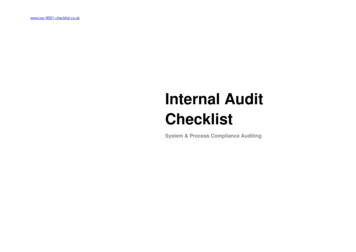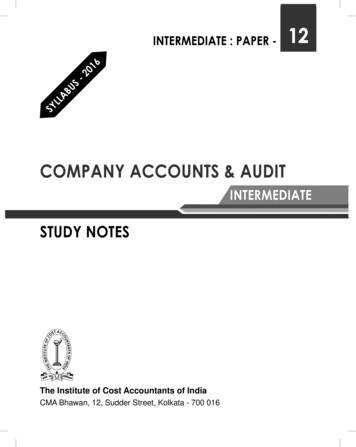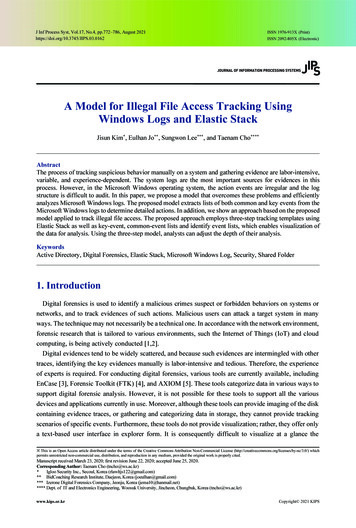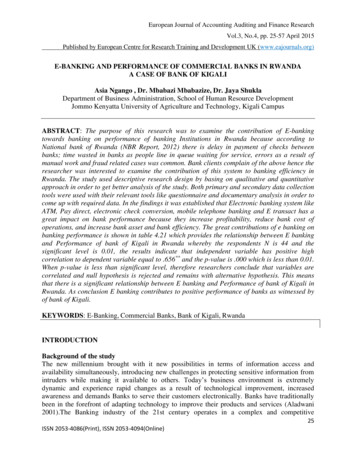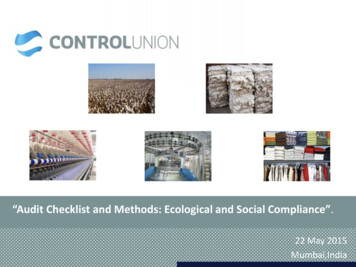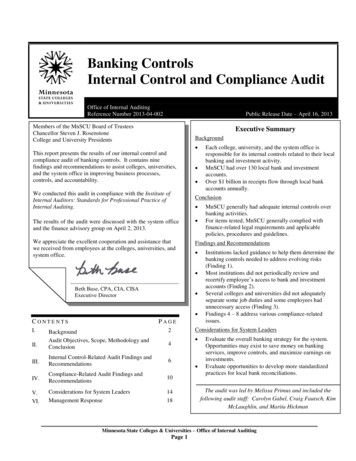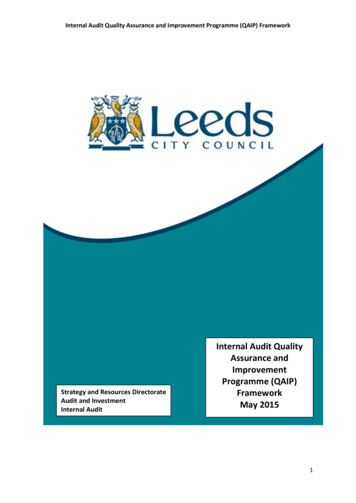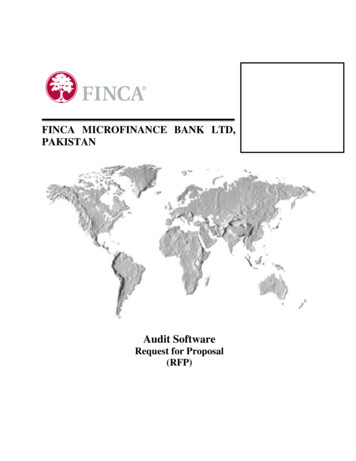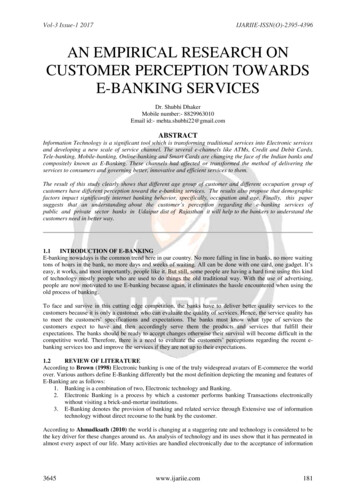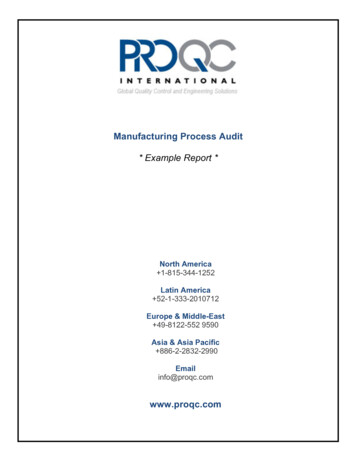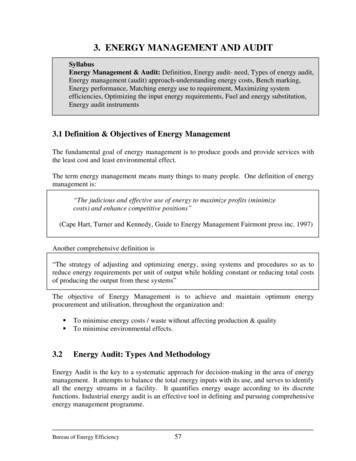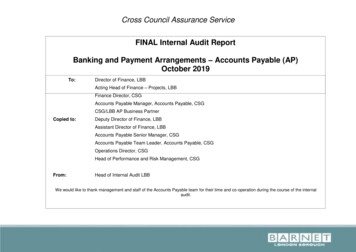
Transcription
Cross Council Assurance ServiceFINAL Internal Audit ReportBanking and Payment Arrangements – Accounts Payable (AP)October 2019To:Director of Finance, LBBActing Head of Finance – Projects, LBBFinance Director, CSGAccounts Payable Manager, Accounts Payable, CSGCSG/LBB AP Business PartnerCopied to:Deputy Director of Finance, LBBAssistant Director of Finance, LBBAccounts Payable Senior Manager, CSGAccounts Payable Team Leader, Accounts Payable, CSGOperations Director, CSGHead of Performance and Risk Management, CSGFrom:Head of Internal Audit LBBWe would like to thank management and staff of the Accounts Payable team for their time and co-operation during the course of the internalaudit.
ContentsExecutive Summary1. Progress against relevant actions from Grant Thornton’s ‘Review of the Financial Management Relating toCPO Fraud’ (Page 6)2. Accounts Payable audit - Findings, Risks and Action Plan (Page 16)3. Appendix 5: Follow-up of past audits – Accounts Payable 2017-18 (Page 39)4. Appendix 6.1: Outcome of detailed testing from Payments Data Analytics and Matching Exercises’reported in February 2019 (Page 43)5. Appendix 6.2 Observations from Payments Data Analytics and Matching Exercises’ reported in February2019. (Page 54)
Executive SummaryAssurance levelNumber of recommendations by risk categoryLimited is review was undertaken as part of the 2018-19 Internal Audit and Anti-Fraud Strategy and Annual Plan approved by the Council’s Audit Committeeon 19 April 2018.The Council’s Accounts Payable function is run by the Customer Support Group (CSG), a Capita function based in Chichester on behalf of the Council.This review identified the key controls over payments made by the Council (outside of the Treasury team) and tested the operation of processes to giveassurance on the effectiveness of those controls. See Part 2 of this report for the outcome of the testing of key Accounts Payable controls.In December 2017, it came to light that potentially fraudulent transactions of ca. 2m had been made against the Council. An investigation was openedby the Council’s Corporate Anti-Fraud Team (CAFT) and it was found that the transactions related to Compulsory Purchase Orders (CPOs). As a resultof the alleged fraud the Chief Financial Officer (CFO) commissioned Grant Thornton (GT) UK LLP to undertake a review of the governance and financialcontrol environment surrounding regeneration projects. In total, 32 recommendations were raised to enhance the financial control environment at theCouncil. As part of this audit we sought to verify that actions related to Accounts Payable from the Grant Thornton ‘Review of the Financial ManagementRelating to CPO Fraud’ have been completed and associated processes are now being complied with. The outcome of this testing is contained withinPart 1 of this report.The review also incorporated the outcome of the separate ‘Payments Data Analytics and Matching Exercises’ reported in February 2019. This includedan assessment of whether any further fraudulent payments had been made – to date no further fraudulent payments were found. See Appendix 6 of thisreport.Finally, we also followed up audit actions from previous audits in this area. See Appendix 5 of this report.Due to the far-reaching nature of this review, incorporating the response to the GT action plan, the fieldwork has been undertaken over an extendedperiod from September 2018 to July 2019.Summary of findings1. Grant Thornton review – outstanding actions, GT15 and GT16, relevant to APGT152
GT Recommendation: We recommend that the BACS process be reviewed for the adequacy of controls over new suppliers where there is no purchaseorder (such as E-form payments).ImplementedFor GT15, segregation of duties is now embedded in non-PO payments as follows:-API E-Form payments authorised by budget manager and independent payment checks (AP) for non-PO (purchase order) OTV (One Time Vendor)and non-PO, non-OTV payments;supplier creation / supplier change requests (Service), related independent checks (AP) and related creation/change (CST, IT Integra SupportTeam) in Integra;the separate authorisation of non-API non-PO payments; andthe provision of adequate supporting documentation for all non-PO payments.Non-PO API payments are now governed by fit for purpose documented procedures which have been implemented. An API Exemption list has also beencompleted defining the types of payment and documentation that are exempt from the standard PO route.GT 16GT Recommendation: The Masterfile supporting the BACS payment process does not automatically identify and flag payments made to differentsuppliers/recipients that had the same bank account number.ImplementedFor GT16, the New Supplier and Supplier Amendment Process which has been implemented will:-mitigate the risk of fraudulent changes to bank details in the manner perpetrated in the recent fraud; andmitigate the risk of the creation of fraudulent suppliers with the same bank account.The creation of new suppliers and changes to vendor bank details are now done by E-Form, the process is segregated and is subject to independentchecks by AP prior to update in the system by ICT.2. Accounts Payable auditThis audit has identified 2 high, 4 medium and 1 low risk rated finding relating to the control design and operating effectiveness of the controls in placeover Accounts Payable as follows:3
Authorisation of Purchase Orders (POs) (High): We found that there was no reporting and review process for dual authorisation of purchaseorders above 1m as required by the “Dual Authorisation for Payments over 1million Process Note V1.0”. For 2/15 purchase orders tested, therelated dual authorisation of the purchase orders above 1m was not attached in Integra as required. Manual upload process (High): Payments, recently to the value of 101m annually, are made though Integra using a manual upload processdefined in a process document “Manual Upload BACS Payments Process V1.0”. The related process document is not clear as to the type ofpayments which may be made through the manual upload process and the schedule of manual payment authorisers, referred to in the document,was out of date as it referred to officers who had left the Council/Capita. Duplicate payments (Medium): Arrangements to identify potential duplicate payments (non-PO and PO) using software, AP Forensics, searchingby payment parameters such as value and payee name were in progress, however had not been implemented despite discussions being ongoingsince 2018. There was evidence of an existing process being possible identifying duplicate payments, however this had only been run oncepending implementation of the new software. Missing supplier invoice (Medium): In 1/10 (10%) instances of our testing of standard PO payments, the invoice was not attached in Integrawhen the audit test was done. The invoice was subsequently found to be attached in Integra however only on 26 June 2019, a significant periodafter it was cleared 5/12/2018 for payment in Integra. We would have expected AP to reject a payment without a supporting invoice. AP training and development (Medium): CSG Management indicated that a programme of training and development existed for the CSG APteam. The programme involved AP officers completing a training needs assessment in which they recorded their understanding of various relatedprocedure documents. Gaps noted in what they recorded, as compared to the content and purpose of the document, informed their training. Wedo not have an issue on the design of the process. However, evidence of its operation had been requested by Internal Audit but had not beenprovided for our review. We can therefore not provide assurance over the effective operation of the control. AP documented procedures (Medium): We reviewed 14 Intranet procedures relevant to AP processing, findings as follows:- 10/14 documents were out of date and had not been reviewed or updated in more than two years.- 4/14 documents had been updated in the course of 2018, but contained information which was out of date around the escalation route for APOther issues and the current supplier request process.Other key documents such as the “New Supplier and Supplier Amendment Process V1.0 (16/8/2018)” Appendix 4: “Budget Managers andSuperiors” was out of date, for example, it included officers who had left the Council. BACS reconciliation (Low): Evidence of the daily BACS payment review processes was provided. However, although the process involved thereview of payments over 35k and the Listing of BACS payments report was retained for referral, it was not clear how the process, by its design,could mitigate the risk of a fraudulent change(s)/alteration(s) to the BACS file after approval, the specific risk referred to in the agreed terms ofreference for the audit.3. Follow-up of previous Audit Actions, refer to Appendix 5 for detailed findings4
We followed up three recommendations made in the Accounts Payable 2017-18 audit. All actions were considered implemented/completed by 31 March2019.4. ‘Payments Data Analytics and Matching Exercises’ (PDAME) reported in February 2019, refer to Appendix 6 for detailed findingsAt Audit Committee 22 November 2018 Members raised a query after the GT report was presented about the possibility of other fraudulent payments inIntegra i.e. the possibility of similar financial failings occurring in other Services across the council. This prompted internal audit to undertake a dataanalytics and matching exercise for the LBB Payments Account which involved the identification of matches, for example payments to one vendor but todifferent bank accounts (such as in the recent fraud), which could relate to potentially fraudulent transactions in a financial environment where controlswere weak. Where matches warranted further investigation in terms of being potentially fraudulent or where they highlighted poor data quality for vendormaster data, they were referred to CAFT and AP for further review.A summary of the findings relating to the data matches, referred matches and review findings are set out in Appendix 6.1.The PDAME identified 11 datasets. Work has been completed with no issues on 5/11 datasets, with work ongoing and approaching completion on 6/11datasets.The data matches identified seven bank accounts that had received fraudulent payments; these were already known to CAFT as part of an ongoing fraudinvestigation. No further transactions reviewed to date have been found to be fraudulent.The Data Analytics review also raised a number of Observations to be considered which are included within this report at Appendix 6.2. It has been agreedthat the AP Finance Business Partner will review the observations as a basis for implementing changes in Integra, in current or future versions/updatesbased on a risk/cost/benefit analysis.5
1. Progress against relevant actions from Grant Thornton’s ‘Review of the Financial Management Relating toCPO orityActionGT15BACS Process fornew suppliersWe recommendthat the BACSprocess bereviewed for theadequacy ofcontrols over newsuppliers wherethere is nopurchase order(such as E-formpayments).High,immediateCSG toreviewprocessfor tus reported toAudit Committee22nd November2018The process hasbeen submitted andverified, however ithas not beenpossible to test theoperatingeffectiveness of thiscontrol, as thecontrol design wasnot finalised in thetesting period.Further testing isrequiredStatus reported to AuditCommittee 31st January 2019Status verbally reported to AuditCommittee May (GT16) and July(GT15) 2019Not ImplementedImplementedThis action is currently rated asNot Implemented due to noassurance having yet beenobtained over the operatingeffectiveness of the associatedcontrols in place. Transactionlistings were requested fromAccounts Payable to allowInternal Audit to verify theoperating effectiveness of newcontrols in place for one timevendors, however there weredelays in the appropriatelistings being provided and as aresult it has not yet beenpossible to carry out theplanned testing. Prior to AuditCommittee Internal Audit willundertake testing against theagreed processes in place,review evidence and discusswith Capita; subject to theoutcome of that testing, therating will be reviewed. Verbalupdate to be provided.a. Non-PO payment includingAPI E-FormsNon-Purchase Order (Non-PO)transactions include payments to:- One Time Vendors – supplierspaid only once and- suppliers that may be paid morethan once where no purchaseorder is required. Where a OTV ispaid more than once, the payeewill now need to be created as asupplier on the Vendor Master Filein Integra.A non- Purchase Order Exemptionlist has been approved by Financeand communicated to AccountsPayable (AP) defining paymentswhich are exempt from the normalpurchase order process. Thesepayments are now processed viaelectronic API E-forms in theCouncil’s accounting system,Integra. They are authorised interms of Integra workflow which isset up to ensure approval in linewith the Schemes of FinancialDelegation, schemes reviewedroutinely and available on theIntranet for referral. Supportingdocumentationmatchingthe6
ionStatus reported toAudit Committee22nd November2018Status reported to AuditCommittee 31st January 2019Status verbally reported to AuditCommittee May (GT16) and July(GT15) 2019payments must be attached withthe Integra API E-Form by theService.AP reject payments not using theIntegra API E-form. They are alsorequired to ensure that supportingdocumentation matches the API Eform detail, including the bankdetails, in terms of the API E-FormVendor Process V1.0 and rejectpayments which do not comply.Evidence was provided to usconfirming that Accounts Payable(AP) were undertaking the API EForm checks for API paymentsthey were required to undertake interms of the “API E-Form VendorProcess V1.0” process document.Our sample testing confirmed thatbank details per the supportingdocumentation matched the bankdetails in Integra.Other types of non-PO paymentswere also reviewed, for examplethose made through the ControCCand Mosaic interface – the socialcare systems in Family Servicesand Adults and Communities - intoIntegra. These were authorisedand supported by sufficientdocumentation.b. New Suppliers7
ionStatus reported toAudit Committee22nd November2018Status reported to AuditCommittee 31st January 2019Status verbally reported to AuditCommittee May (GT16) and July(GT15) 2019Where suppliers are paid morethan once, a vendor accountneeds to be created in the IntegraVendor Master File. Creation of thenew vendor or changes to thevendor details are governed by the“New Supplier and SupplierAmendment Process V1.0”. ASupplier E-Form is:- created in the Service withsupportingdocumentationincluding bank details,- completed by AP after they haveconducteddetailedsupplierchecks in terms of the abovedocument and then- created in the system by ICT.Evidence was provided to us thatAP were undertaking the newsupplier and change in bank detailchecks they were required toundertake in terms of the “NewSupplier and Supplier AmendmentProcess V1.0” process document.Our testing confirmed that bankdetailsperthesupportingdocumentation provided with thesupplier E-Form matched the bankdetails in Integra.SummaryFor GT15, segregation of duties isnow embedded innon-POpayments as follows:8
ionStatus reported toAudit Committee22nd November2018Status reported to AuditCommittee 31st January 2019Status verbally reported to AuditCommittee May (GT16) and July(GT15) 2019----API E-Form paymentauthorised by budgetmanager and independentpayment checks (AP) fornon-PO (purchase order)OTV (One Time Vendor)and non-PO-non OTVpayments andsupplier creation / supplierchangerequests(Service),relatedindependent checks (AP)andrelatedcreation/change (CST, ITIntegra Support Team) inIntegrathe separate authorisationofnon-APInon-POpaymentsthe provision of adequatesupporting documentationfor all payments.In terms of the recent fraud wherethe fraudster changed the bankaccount details of an existingmaster file vendor (a solicitor) tohis own, this would not be possiblethrough the AP route as thechange in bank details would besubject to independent check byAP in terms of the “New Supplierand Supplier Amendment ProcessV1.0”9
ionStatus reported toAudit Committee22nd November2018Status reported to AuditCommittee 31st January 2019Status verbally reported to AuditCommittee May (GT16) and July(GT15) 2019Related PDAME outcomes refer to Part 4 for detailedfindings on matches andreferral findings/progressThe PDAME identified matchesrelating to bank details that werereferred to CAFT and AP forfurther review.1.1VendorsReceivingPayments into Multiple BankAccounts (non OTV) – matcheditems related to low risk changes inbank sort code. Matches were notescalated to CAFT/AP for furtherreview.2.1 Amendments to SupplierBank Details – 13/52 matcheswere referred to AP and 7/52matches to CAFT for furtherreview,AP: Confirmation of validity of bankaccount changes resolved for4/13, in progress for 9/13CAFT:Investigationscompleted without issues.107/7
ionGT16Duplicate bankingdetailsThe Masterfilesupporting theBACS paymentprocess does notautomaticallyidentify and flagpayments made todifferentsuppliers/recipients that had thesame bankaccount number.There was also nomanual control inplace to identifyBACS and CHAPSpayments made todifferent supplierswhich had thesame bankaccounts. Werecommend thatthis control beconsidered as anaddition to the newTreasury PaymentProcedure.MediumPut inplacecontrolstoidentifyBACSandCHAPSpayments madetodifferentsuppliers withthesamebankaccounts andupdatetheTreasuryPaymentProcedureaccordingly. Anyexceptions needto beclearlydocumentedandassuranStatus reported toAudit Committee22nd November2018The process hasbeen submitted andverified, however ithas not beenpossible to test theoperatingeffectiveness ofthese controls, asthe control designrelating to one-timevendors was notfinalised in thetesting period, andthe e-form used toset up newsuppliers withinIntegra was not yetlive within thesystem. Internalaudit has reviewedthe process asagreed with GT, buthave not yet beenable to test thisindependently.No issues werenoted with theoperatingeffectiveness of thechecks carried outover the validity ofsupplier detailswithin the TreasuryPayment Process.Status reported to AuditCommittee 31st January 2019Status verbally reported to AuditCommittee May (GT16) and July(GT15) 2019Partly ImplementedImplementedThe recommendation aswritten does not reflect the factthat CHAPS and BACSpayments are processeddifferently. CHAPS payees arenot set up as suppliers withinIntegra, whereas BACSpayees should be set up assuppliers unless they areprocessed as one-timevendors.a. Duplicate banking details(payments to different vendorswith the same bank account)We have completed testing forCHAPS payments and aresatisfied that the action isImplemented for these types ofpayments. However, for BACSpayments our testing is stillongoing (see also GT15).Audit will review furtherevidence and discuss withCapita.The New Supplier and SupplierAmendment Process which hasbeen implemented should supportmitigation of the risk of creatingfraudulent/ fictitious vendors inIntegra (many suppliers with thesame one bank account of thepotentialfraudsterinthisinstance). The creation of newsuppliers is now done by VendorE-Form, is segregated and issubject to independent checks byAP prior to update in the system byICT in line with the process. Therobust process should thereforedeter the creation of fictitiousvendors in Integra in the firstinstance.Supporting detective reportingidentifying where payments madeto different suppliers/vendors withthe same bank account details willbe achieved once the softwarepackage AP Forensics has beenimplemented. Commissioning andimplementation of the software isbeingoverseenbytheCouncil/Capita AP Task Groupresponsible for improvements inthe financial control environment11
ionceprovidedaroundthecontrolsrelatingto thoseprocesses.Status reported toAudit Committee22nd November2018Status reported to AuditCommittee 31st January 2019Status verbally reported to AuditCommittee May (GT16) and July(GT15) 2019for payments. We understand thatprocurement and implementationof the software is imminent. Thefirst demonstration of the softwarehas confirmed that such detectivereporting will be possibleRelated PDAME outcomes refer to Part 4 for detailedfindings on matches andreferral findings/progressThe PDAME identifying matchesrelating to different vendors havinga common bank account werereferred to CAFT and AP forfurther review.1.2 Multiple Vendors ReceivingPaymentsintoCommonAccounts – 55/101 matchesreferred to AP and 7/55 supplierscovering 3 bank accounts werereferred to CAFTAP: Investigations resolved noissues for 3/55, In progress 52/55CAFT: Investigations resolved withno issues for 4 suppliers covering2 bank accounts, In progress for 3suppliers covering 1 bank account.2.2 Multiple Vendors Sharing aCommon Bank AccountReferred 284 / 296 matches to AP12
ionStatus reported toAudit Committee22nd November2018Status reported to AuditCommittee 31st January 2019Status verbally reported to AuditCommittee May (GT16) and July(GT15) 2019and 8/296 covering 2 bankaccounts to CAFTAP: 138/284 already resolveddeactivated, 146/284 in progress.CAFT: 8 suppliers 2 bankaccounts in progress, furtherinformation has been submitted toAP for n Accounts – CAFT havecompleted checks on Integra.There are some matches whichremain unverified and have beenescalated to AP for further reviewand for them to respond with anysuspicions.b. Misuse of the One-TimeVendors) OTV processThere will be occasions whenundertaking Council business thatone-off payments to persons(OTV) may be required.To ensure that officers do not usethe One Time Vendor processexcessivelytobypassthestandard PO and vendor creationprocesses,Integranowrecognises when an OTV paymentis made to a bank account used foran OTV payment before. In this13
ionStatus reported toAudit Committee22nd November2018Status reported to AuditCommittee 31st January 2019Status verbally reported to AuditCommittee May (GT16) and July(GT15) 2019case the OTV payment will berejected and the supplier will thenbe required to be set up as avendor in Integra as part of theVendor Master Data. The creationof the vendor will be subject to thevariousindependentchecksreferred to in GT 15 above.Where OTV payments are paid bycheque or to different accounts,the above bank account rejectionwill not apply. This will beaddressed by the introduction ofAP Forensics which will allow therejection of payments based onOTV payee name too. For chequepayments, in the interim, Finance,following discussion with CashBook team, will investigatewhethertheCSGteamresponsible for producing Integracheque runs will identify wherepayees paid by cheque havepreviously been paid by BACS orcheque.The action is under ongoing reviewby the Capita/Council AP Taskgroup responsible for improvingthe control environment overCouncil payments.Action:14
ionStatus reported toAudit Committee22nd November2018Status reported to AuditCommittee 31st January 2019Status verbally reported to AuditCommittee May (GT16) and July(GT15) 2019AP Forensics meeting all userreportingneedswillbecommissioned and implemented.Responsible officer:Acting Head of Finance – ProjectsHead of Financial Systems,CapitaTarget date:31 August 2019Related PDAME outcomes refer to Part 4 for detailedfindings on matches andreferral findings/progress4.1 One Time Vendors (OTVs)Receiving More than OnePayment – in progress, resolvedfor CAFT no issues (bankaccounts correct in relation Multiple Bank Accounts – inprogress, CAFT have requestedfurther information from AP15
2. Accounts Payable audit - Findings, Risks and Action PlanRef1FindingAuthorisation of purchase orders (PO)Location 6 payments (Standard PO transactions)The Dual Authorisation for Payments over 1million Process Note V1.0requires the dual authorisation of purchase orders over 1m. Theprocess document referred to the quality checking as follows:“Quality Checks: A report will be run on a monthly basis for paymentsover 1million to check the requisitions have the necessary formattached.”We found that there was no reporting and review process as stated.We tested a sample of 15 payments through location 6 in Integra forwhich purchase orders were raised. The 3-way match of invoice, goodsreceipt and PO was evident, however the dual authorisation of 2 / 15purchase orders was not attached in Integra as required by DualAuthorisation for Payments over 1million Process Note V1.0.RisksIf planned expendituredoesn’t support theCouncil’s objectives oris not aligned withbusinessneedsthrough the lack ofappropriate scrutinyand challenge, forexample,ifdualauthorisation is notobtainedforexpenditure,wherenecessary then eed actionCapita (non-AP):a(i): A list of purchase orders raised inIntegra above 1m will be provided toCouncil Finance monthly.Responsible officer:Integra teamTarget date: 31 October 2019Council Financea(ii): Finance will ensure that the DualAuthorisation form is completed for allPOs above 1m on the monthly list.Finance will ensure that the form iscompleted correctly in line with theCouncil Constitution and is attached inIntegra for referral.Responsible officer:Acting Head of Finance – ProjectsLocation 4 (non- standard PO approval) – Office DepotPayments in Integra through this location for stationery are low in value.Once POs are raised, related requisitions are charged through ElectronicData Interchange (EDI) invoices. The acquisitions are not subject to agoods receipting process by the Service. We understand that there is anautomated goods receipting process within Integra, however thisincreases the risk that payments may be made for goods not delivered,including theft, as there is no formal confirmation of receipt. One OfficeDepot transaction (reference: 0040002817) was for an amount ofIf payments are madefor office stationarythat is not receivedthrough a lack of aformalreceiptingprocess then there isa risk of financial lossandbudgetoverspends.Target date:31 October 2019Council Financeb(i): Finance will ensure thatexpenditure with Staples, the supplierreplacing Office Depot, is set up inIntegra to follow the standard PO route,so the 3-way match of PO, GoodsReceipt and invoice, with purchase16
RefFindingRisksRiskcategoryAgreed action 3,556.80. We would have expected goods receipting for an invoice ofthis value.order approval in Integra in line with theFinancial Scheme of Delegation.We tested a sample of 8 payments ranging from 50 to 3600 in 201819 and 2019-20. In 2/8 cases the PO was not approved by the budgetmanager referred to in the prevailing Financial Scheme of Delegation(FSoD).Responsible officer:Acting Head of Finance – ProjectsTarget date:31 October 2019Although the transactions are low value, the finding suggests that theIntegra approval workflow may potentially not be aligned with the relevantapproved SoFD at all times.Accounts Payable (AP)At the time of this report the Council’s stationery supplier was due tochange to Staples from Office Depot.b(ii): Thereafter, Staples invoices willbe released for payment following thestandard PO route, the 3-way match ofinvoice, goods receipt and PO.Family Services authorisation limits in ControCCResponsible officer:In Family Services, we noted that Heads of Service were able toauthorise services up to 181,302 as stated in the Family ServiceFinancial Scheme of Delegation within the Children’s Service Scheme ofDelegation in the Constitution. However, in LCS, the Family Servicessocial care system, the Heads of Service limit for approving services wasset at 250,000. This did not affect our sample tested as commitmentsselected were all below the 181,302 limit in the Constitution.Accounts Payable Manager, AccountsPayable, CSGFamily Services Finance provided us with a document, “Authorisingspend - what you need to know”, which they used together with theChildren’s Service Scheme of Delegation and which referred to the limitof 250,000.c. Finance will review the authorisationlimits as stated in the “Authorisingspend - what you need to know”document, governing the authorisationlevels of social care management forapproving cost commitments in LCS,the Family Services social care system- set in ControCC, the Family Servicesfinancial system - to ensure that theyare consistent with the Council’sConstitution. Authorisation limits will beOur initial view is that the limits set in ControCC need to be updated atthe Head of Service level so that they align with the Constitution and thatFinance should review the validity of the document.We have not tested the commitment cost approval levels in Mosaic, theAdults social care system, as our testing related to authorisation at theTarget date:31 October 2019Council Finance17
RefFindingRisksRiskcategoryinvoice level and matching to commitments. However, a review of theposition in Adults and Communities should also be undertaken to ensurethat the SoFD and related limits in Mosaic are aligned.Agreed actionupdatedinContro
Accounts Payable Senior Manager, CSG Accounts Payable Team Leader, Accounts Payable, CSG Operations Director, CSG Head of Performance and Risk Management, CSG From: Head of Internal Audit LBB We would like to thank management and staff of the Accounts Payable team for their time and co-operation during the course of the internal audit.
